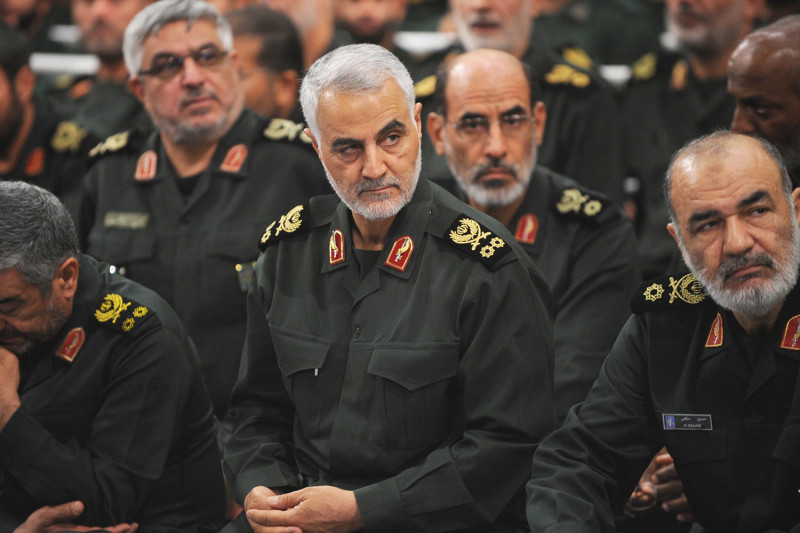IN THE MEDIA
The killing of arch-terrorist Soleimani changes the regional rules of the game
January 10, 2020 | Colin Rubenstein

An edited version of this article appeared in The Age and Sydney Morning Herald on January 10, 2020.
The US drone attack that killed Iranian Gen. Qassem Soleimani at Baghdad Airport on January 3 was militarily and morally justified. Any expected retaliation by Iran, including the reported targeting of US forces at two Iraqi bases on January 8, does not diminish the potential of that bold move to change the regional rules of the game in a positive fashion and increase pressure on Iran to reconsider its destabilising regional policies.
Although some commentators have characterised the airstrike as an impulsive decision, scenarios where Soleimani would be removed from the battlefield had reportedly been discussed by US defence analysts both openly and behind closed doors for months.
Military plans to strike Soleimani had certainly been prepared even earlier, to be implemented rapidly, if necessary. Such plans would have also included real-time risk assessments of the potential consequences.
The US Administration’s decisive blow should be understood as a calculated move to remove one of Iran’s major pieces from the regional chessboard – a move that Washington-based Brookings Institute Senior Fellow on Foreign Policy Michael O’Hanlon has compared to the US downing of Japanese Admiral Yamamoto’s plane during World War II.
Soleimani was the key enabler of the Iranian regime’s overarching policy of military aggression and expansionism, proxy warfare and sponsorship of global terror that preceded him, going back to the 1979 revolution.
Soleimani’s Quds Force is the branch of Iran’s Armed Forces responsible for all of the regime’s activities to interfere in and undermine its neighbours, including supporting, training, arming and directing numerous terrorist groups
From out of the fog of recent wars in Iraq, Syria, Gaza and southern Lebanon, a trail of regional mayhem and destruction leads back to Soleimani, who played a pivotal role in planning, design and execution of these military campaigns at the bidding of the Iranian regime.
Soleimani directed the supply of potent weapons and specialised military technology to militias and insurgents fighting coalition forces in Iraq in the 2000s, making him responsible for the deaths of hundreds of US soldiers – and likely targeted Australians as well.
Soleimani’s fingerprints were all over the regime’s most nefarious activities, including the killing of hundreds of thousands of Syrians and the displacement of millions more to prop up the Assad regime; the effective takeover of Lebanon by the terrorist Hezbollah organisation and its arming with well over 100,000 missiles; the murder of former Lebanese PM Rafiq Hariri, along with 21 other people, in a car bomb attack in 2005; the numerous attacks on Israel by the Hamas and Palestinian Islamic Jihad terror groups; the uprising by the Houthis against the recognised Government of Yemen and the subsequent bloody Civil War there, numerous missile attacks on Saudi Arabia including a devastating hit on its oilfields, and the killing of hundreds of anti-government protesters in Iraq and in Iran itself.
The primacy for the Iranian regime of ‘exporting the Revolution’ meant that Soleimani was, in effect, the country’s most senior military leader, and had access to billions of dollars made available to the regime by the 2015 Iran nuclear deal that could have otherwise been used to improve the standard of living of Iranian civilians.
Having gotten away with so much in the past, Soleimani and his regime apparently believed they could continue these activities without experiencing any consequences for their actions. However, attacks on Americans in Iraq and then on the US Embassy there in recent weeks, and reported intelligence that Soleimani was preparing further attacks on Americans, were apparently red lines for the US Administration.
With the targeted killing of Soleimani, the US has reminded Iran that its senior military commanders who plot operations that kill US military personnel and civilians are legitimate targets. Iran must now decide whether Soleimani’s successor will continue in his ways, with predictable results, or change this destabilising rogue-state behaviour.
Iran’s predictable retaliation, taking credit for Wednesday’s rocket attack against US troops based in Iraq, was doubtless part of the calculated risks factored in when the attack on Soleimani was green-lighted.
Yet allowing Iran’s military leaders to spread violence, terrorism, subversion and extremism unchecked would be an even more risky, destructive and dangerous course of action.
Under the background of heightened tensions between the US and Iran, Australia, which maintains relations with Iran as well as a special relationship with our US allies, must now plot a delicate, reality-based path forward to protect our interests as well as our military personnel in the region. We must recognise that neither side wants an escalation into war, but while accidental escalation is a significant risk, Iran’s rogue state behaviour cannot go unpunished and unanswered.
It is a situation which Australia approaches with eyes wide open. As Defence Minister Senator Linda Reynolds confirmed this week, Australia has “long been concerned” by Iran’s behaviour in the Middle East. So it can only be assumed the Morrison Government is prudently reviewing its diplomatic posture towards Iran in the face of rapidly changing developments.
Dr. Colin Rubenstein is Executive Director of the Australia/Israel & Jewish Affairs Council (AIJAC). Previously, he taught Middle East politics for many years.
Tags: Australia, International Security, Iran, Iraq, United States





